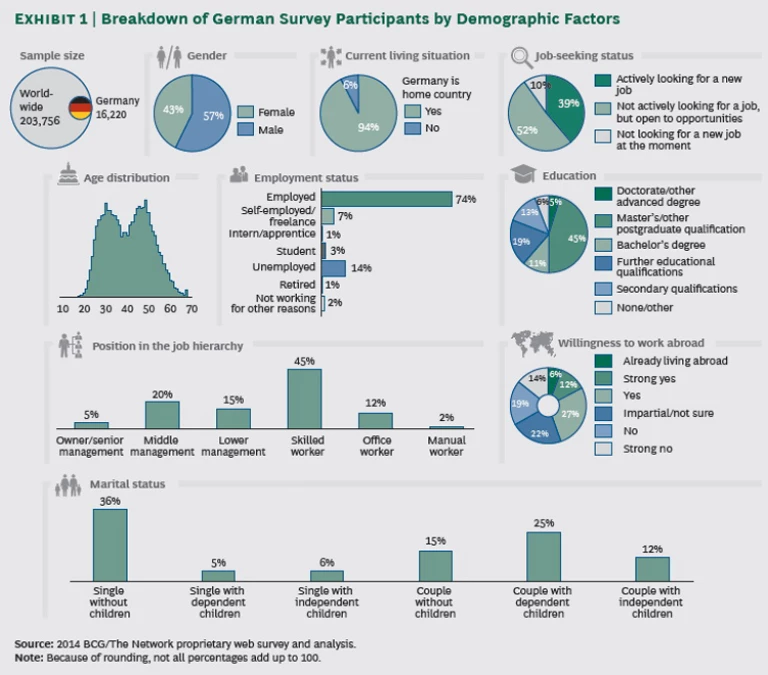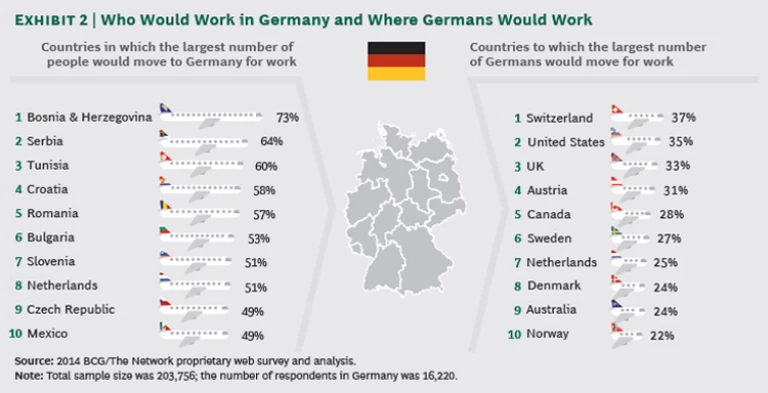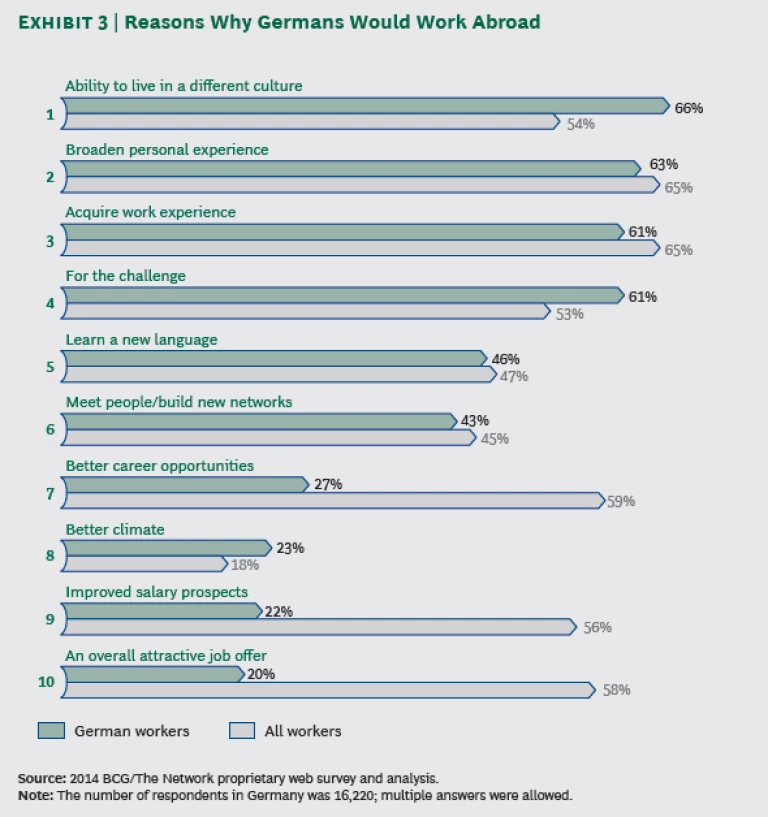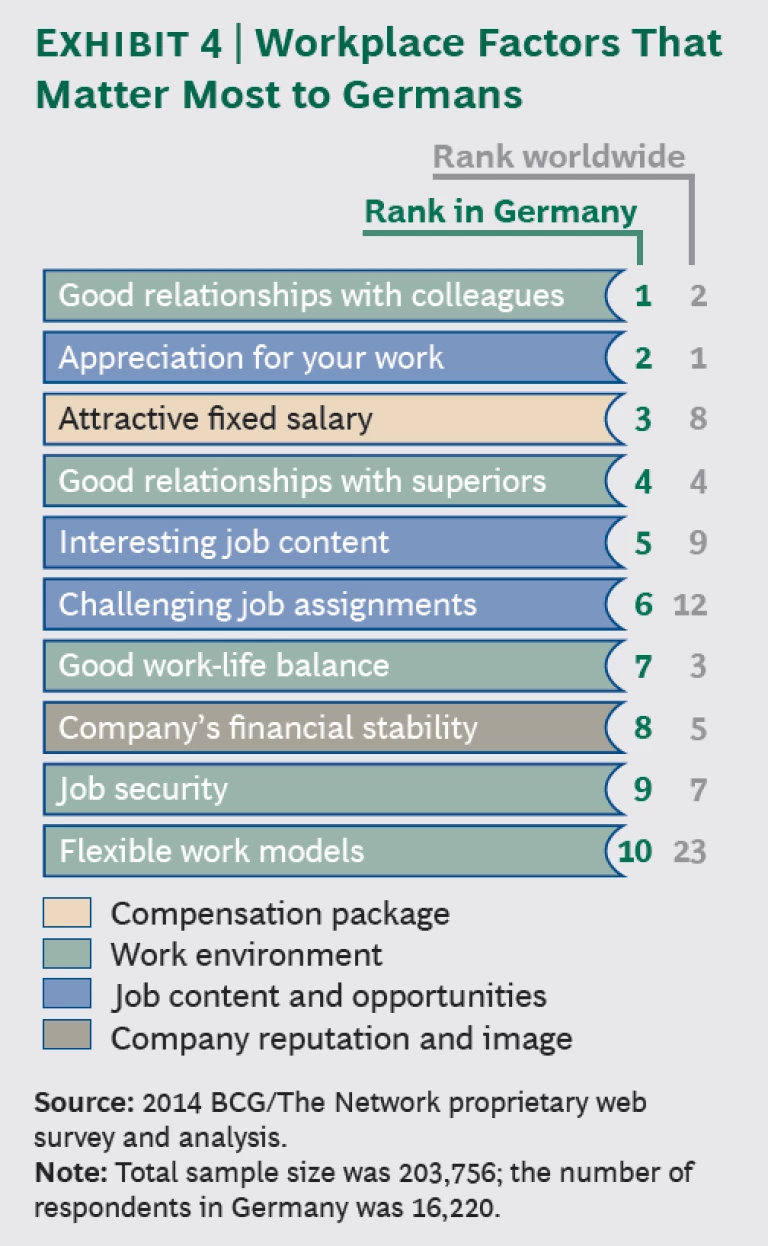Germany’s economy continues to outperform most other European economies, and people in the country generally don’t see a reason to look for work elsewhere.
Related Content
- Decoding Global Talent
- Swiss Workers
- US Workers
- UK Workers
Only 44 percent of Germans have any interest in going abroad for work, significantly below the global average of 64 percent who say they would consider a job abroad, according to a survey by BCG and StepStone Deutschland, an employment website that is part of The Network. The survey had respondents in 189 countries, most of them current or recent job seekers. (See Exhibit 1.)
For Germans who are willing to move for work, “abroad” often means “next door.” Aside from the internationally popular English-speaking countries—the U.S., the UK, Canada, and Australia—Germans’ top preferred foreign work destinations are German-speaking neighbors Switzerland and Austria. Other countries that appeal to German workers—the three Scandinavian countries and the Netherlands—are likewise relatively close by. (See Exhibit 2.)
Among Germans willing to work abroad, two-thirds say the biggest reason to do so would be to live in a different culture. Worldwide, the proportion of people citing the ability to live in a different culture as a reason for working abroad is substantially lower, at 54 percent. Germans are also more likely than the world average (61 percent, as opposed to 53 percent) to say they would take a job abroad to challenge themselves. (See Exhibit 3.)
German job seekers don’t necessarily associate going abroad with getting a better job offer or more money. These reasons are relevant to barely one in five job seekers in Germany, which rebounded well from the 2008 financial crisis and is seen as having a strong job market.
Germans are much more likely than workers elsewhere to say that interesting job content and challenging work assignments are important to them. These factors rank fifth and sixth in importance, respectively, among Germans’ job preferences. Among workers globally, by contrast, interesting job content ranks ninth in importance and challenging job assignments ranks twelfth. (See Exhibit 4.)
Germany is the fourth most popular international work destination overall, with 33 percent of job seekers saying they would be willing to move there. Only three countries that are primarily English-speaking—the U.S., the UK, and Canada—are more popular as work destinations. Fifty-one percent of people from the Netherlands, 43 percent of people from Italy, and 40 percent of people from India say they would work there. Germany is the second most popular destination, after the UK, for people from the U.S.
The country is particularly appealing to southeastern Europeans. This includes almost three out of four people in Bosnia and Herzegovina, and more than three of every five Serbians. Among countries farther afield, people in Tunisia and Mexico also express significant interest in Germany.
In many countries that are popular work destinations, at least one city has worldwide tourist appeal. Germany has two. Berlin is famous for its history and museums, and its technology start-ups draw software developers and other highly trained workers. Munich (home to BMW, Siemens, and the industrial gas company Linde) is likewise a strong economic center; it also has an art center and hosts Oktoberfest, attended by millions of people annually.
Ivan Najan, 24, came to Germany for the sake of his girlfriend, an American he met on a European backpacking trip who has a long-term teaching contract in Germany. A native of Brazil, which has struggled with social problems including high crime rates even as its economy has surged, Najan has been impressed by Germany’s sense of order. The country, he says, is “well-rounded in all aspects” and makes the most of what it has.
“The planning and [infra]structure are just amazing here,” he says. “You can go anywhere on public transportation, and there’s a great health system and public education system, not to mention public security.”










